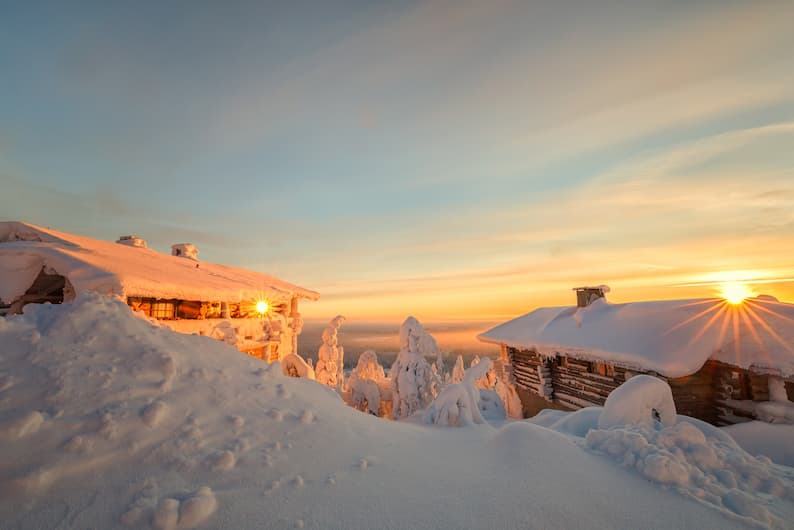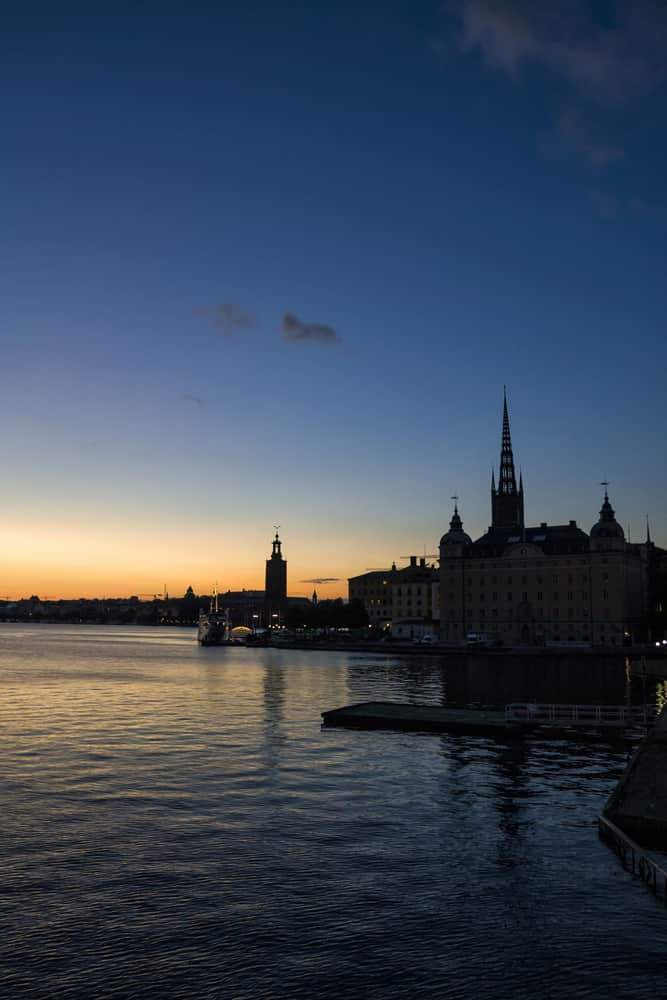When you picture Sweden in winter, you probably see long, dark days in snow-covered landscapes where the sun never rises. Similarly, in summer, you may see fields bathed in the sun’s rays at midnight.
But is that accurate for summer – or does it get dark in Sweden? And similarly, is Sweden actually dark for months in winter?
Well, as you’ll see, the answer is yes and no. Keep reading to see where those stories of a sun that never appears or a darkness that never arrives may have an element of truth.

Table of Contents
Does it get dark in Sweden?
It certainly gets dark in Sweden, with very short days in the winter months. However, most parts of Sweden still have some light during this period because the sun never completely disappears below the horizon. Similarly, while days are very long in Swedish summers, you’ll often have some darkness.
When night occurs for more than 24 hours (that is, when the sun doesn’t rise at all during the day), this is called the “polar night”. Similarly, days where the sun does not set during summer is known as “midnight sun”. Both of these occur within the Arctic and Antarctic Circles.
Most of Sweden is well outside of this region though, so the expected Swedish stereotype of it always being night time isn’t quite accurate. This means that, even in the short days of winter, there will be a few hours of light during the day, with less as you go further north.
The opposite is also true in summer, where while most of the time living in Sweden involves having very long days, you tend to get a couple of hours of darkness at night, although you can often see some light on the horizon during that period.
Back to basics: Do Swedish People Speak English?
Is Sweden dark for months?
No, it is never dark for months in Sweden. This is because, even in winter, most parts of the country do have at least a couple of hours of daylight. The one exception is the area of the country within the Arctic Circle, but even there it is only dark for around one month.
In particular, if you’re looking for long periods of darkness, you should head to Kiruna, the northernmost city in Sweden, which is located in the Arctic Circle.
The polar night in Kiruna lasts around 28 days until the beginning of January. During that period, they have an incredible “blue hour” at about 2pm where while the sun doesn’t rise, the city and surrounding landscapes are bathed in a beautiful blue light, with soft pink streaks in the sky for a sunrise that never quite happens. It’s truly spectacular.
Does it get dark in Sweden in summer?
It does get dark in most parts of Sweden in summer, although generally only for a few hours and often with some light being visible on the horizon. Only in areas of Sweden located in the Arctic Circle do you have days where the sun doesn’t set for several weeks.
I mentioned Kiruna earlier as the last of the polar night, but it’s also known for its midnight sun. Specifically, they have the midnight sun for 47 days in the middle of the year, although it’s more common to actually describe it as 100 days without nights. This is because even if the midnight sun may not be on show during those extra days, it’s still very bright.
Most major cities don’t have that much light though. That said, if you do happen to be in Sweden on the longest day of the year – even “just” in Stockholm, so not that far north – the ongoing twilight throughout most of the night when the sun sets for a few hours, but doesn’t quite seem to leave the city in full darkness for very long, is a really amazing experience.

What’s the longest day in Sweden?
The longest day of the year in Sweden is the summer solstice on June 21st. On this date in Stockholm, sunrise is at 3:31am and sunset is at 10:08pm, with the amount of night getting shorter the further north you go.
I will also say that even for those few hours between sunrise and sunset in Stockholm, it’s not fully dark for very long. I say this having actually spent the summer solstice in Stockholm once myself and even at midnight, it’s almost like a dark twilight. It’s both very cool and very weird and I would highly recommend it.
In Sweden, when is sunrise and sunset in summer?
In the most populated cities in Sweden, sunrise and sunset in summer is at around 4:00am and 10:00pm respectively. The exact time will depend on where you are and what time of the season it is. The further north you are and the closer it is to the summer solstice, the longer the day will be.
For instance, I gave you the sunrise and sunset times in Stockholm on June 21st just above but if you travel to Malmö, in the south of Sweden, sunrise on that day is at 4:24am and sunset is at 9:55pm.
On the other hand, in Kiruna in the far north, the sun will not set at all for a number of weeks in summer, giving you the incredible midnight sun phenomenon.
You may also be interested in: Stockholm vs Copenhagen: Which Is Better to Visit?
What time does it get dark in Sweden in winter?
It gets dark quite early in most parts of Sweden in winter, with sunset in Stockholm on the winter solstice on 21 December being at 2:48pm. The further north you go and the closer it is to this date, the earlier it will get dark in winter.
To use the example of Malmö again, it gets dark at 3:37pm there on 21 December, giving almost a whole extra hour of light compared to Stockholm further north.
Of course, once again, that doesn’t compare to Kiruna which is known for its polar night, although this isn’t for the whole winter. In fact, by 21 January – one month after the winter solstice – the sun rises at 9:43am and sets at 1:58pm. You can imagine how that four hours of sun feels like after several weeks of none at all!
